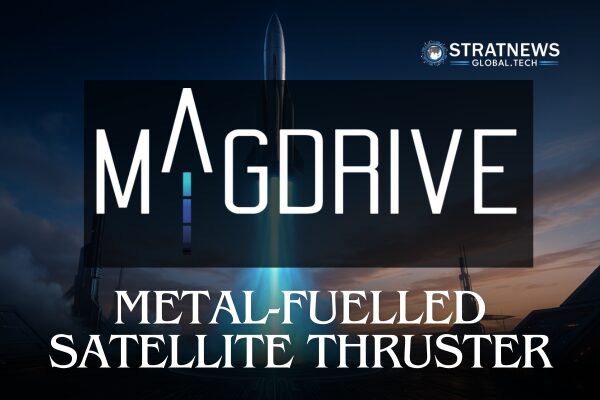UK Startup Advances Electric Propulsion for Satellites
Magdrive, a UK-based startup, is pioneering a new era in spacecraft propulsion with its electric, metal-fuelled thrusters. Rogue, designed to enhance satellite manoeuvrability, the lightweight system could significantly change how spacecraft operate in low Earth orbit (LEO).
The Rogue thruster weighs only 2.5 kilograms and uses pulsed plasma propulsion powered by solid metal propellant. Energy is stored in onboard supercapacitors, drawing power from a solar array. This allows for efficient thrust generation without relying on traditional liquid fuels.
Metal-Fuelled Thrusters Provide Enhanced Manoeuvrability and Longer Missions
According to Magdrive CEO and co-founder Mark Stokes, the Rogue system provides satellites with more freedom to move in orbit. “That means we can open up entirely new capabilities and services for satellites to manoeuvre without regret and reach orbits previously out of reach,” he said.
This step-change in satellite agility is critical as LEO becomes increasingly congested. More precise movements will help avoid collisions and enable a wider range of orbital services and research activities.
CTO and co-founder Dr Thomas Clayson believes this technology could support a broader space ecosystem. “We’re going to enable an entirely new ecosystem to exist in space, which will benefit everyone on Earth and help us push deeper into the solar system,” he said.
In-Orbit Test Set for 2025
Magdrive’s Rogue thruster will undergo a major test in June 2025 as part of a D-Orbit mission. Two Rogue units will be deployed aboard the ION Satellite Carrier—a logistics platform that delivers satellites to exact orbital positions and performs in-orbit tasks during a six-month mission.
This in-orbit demonstration is vital for validating the thruster’s performance under real space conditions. The propulsion system fits within a compact 2U CubeSat and expels plasma in steerable bursts, ensuring efficient and controlled movement.
A Future Powered by Metal Propellant
The startup highlights metal as a sustainable and efficient propellant. “There’s plenty of metal on Earth, and we don’t need much for each satellite,” Stokes said. He also envisions a future where metals mined on the Moon or recycled from space debris fuel future missions.
Looking ahead, Magdrive plans to develop a more powerful thruster with the capability to be refuelled in orbit. This could dramatically extend the operational life of satellites and spacecraft, unlocking long-duration missions and deeper space exploration.
with inputs from Reuters


